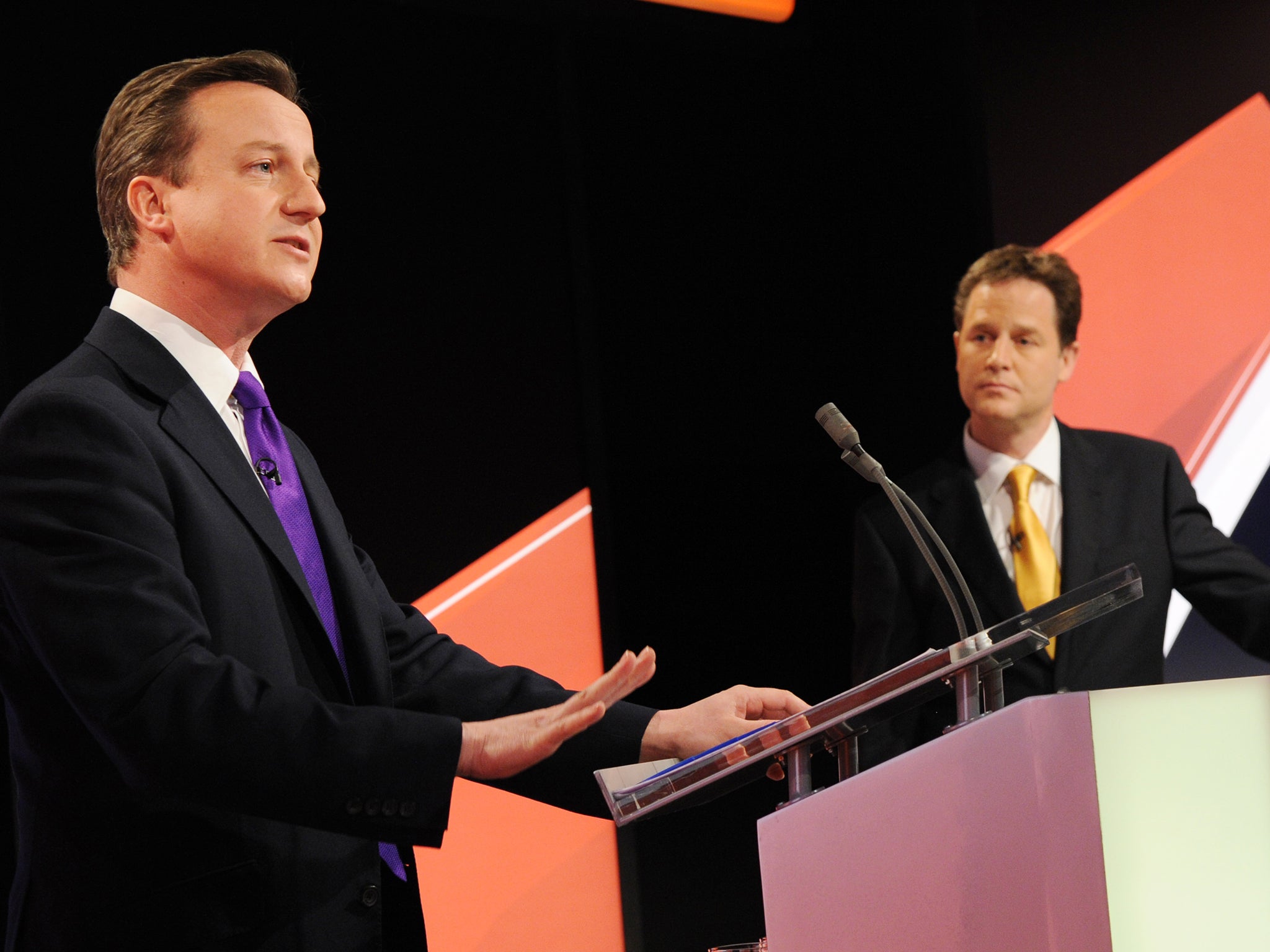I agree with David Cameron – there will be no TV debates
Labour and the Lib Dems are desperate not to have Natalie Bennett on the stage


Impossible, incredible and infantile: welcome to the parties' claims in the coming election. How is the voter supposed to make sense of it all?
All the parties have an incentive to exaggerate their differences. George Osborne wants to set out cuts in public spending that are too deep for Labour to copy and that show the public finances going into surplus by the 12th of Never, so that he can present the Tories as fiscally responsible and Labour as the opposite. Labour, meanwhile, has seized on a line about spending on public services going down to a share of the economy last seen in the 1930s to pretend that the Tories want to close the NHS so that shoeless children get rickets.
As Hamish McRae points out today, the differences between the parties' plans for taxing and spending are actually small. They are much, much smaller, for example, than the differences between what the coalition promised and what it delivered. This will be made explicit this week, possibly to the embarrassment of all three main parties, when the House of Commons passes the Charter of Budget Responsibility.
This trick of Osborne's is a bogus device, a waste of allegedly valuable parliamentary time designed purely to trip Labour up, on the assumption that Ed Balls wouldn't be able to vote for it. Unfortunately for Osborne, master strategist political genius (first class), he forgot that he was in coalition with a bunch of pinkos called Liberal Democrats, who didn't agree with cutting public spending to a percentage of GDP last seen under the last Labour government. Confused? You will be.
The upshot is that on Tuesday the Commons will be presented with a joint Tory and Lib Dem form of words that is compatible with Labour's plans. Crucially, the aim set out is for the "current" budget to balance. Current spending excludes spending on capital projects, so it allows for Labour's plan to "borrow to invest". Fiscally, that is the main difference between the parties in May, and it is not much, because Balls has put a limit on his borrowing. He pledges that, by the end of the parliament, a Labour government would be adding to the national debt at a slower rate than the economy is growing, so that the national debt would start to fall as a percentage of the economy. Vince Cable agrees. Osborne, on the other hand, wants the national debt to start falling in absolute terms.
It is a difference, but it is not as big as any of them pretend – and anyway everything will probably have changed by 2020. For the first year after the election, however, Labour has already accepted the Government's spending plans, just as it did (for the first two years) in 1997.
How, then, are we to assess rival politicians' plans for our future? One obvious means would be the televised debates, but they were never going to happen this time around and last week we saw why. The decision by Ofcom, the media regulator, to classify the Greens, provisionally, as a "minor" party does not directly affect Natalie Bennett's right to take part in the TV debates, but it does point up the problem of deciding who takes part.
The format of the debates has to be agreed between the broadcasters and the parties. Given that one of the party leaders, David Cameron, recognises that it is not in his interest for them to go ahead at all, agreement will not be possible. Debates are never in the interest of the incumbent, and the only reason they happened last time was because Gordon Brown was so unpopular that he felt like a challenger.
The broadcasters will be unable to shame the Prime Minister into taking part because it will never be clear enough that he is blocking them, not least because there are good arguments against whatever is proposed.
The broadcasters started by proposing the same as last time – three debates with three leaders. That might have been awkward for Cameron to refuse, but the broadcasters blinked first when Ukip barked. Without consulting the parties, they changed their proposal to a four, three, two format: four leaders, including Nigel Farage, followed by three, and finally the two candidate prime ministers, Cameron versus Ed Miliband. The Green Party instantly objected, allowing Cameron to make the reasonable point that the Greens have an MP and almost as much support in the opinion polls as the Lib Dems. And, privately, he points out, again rightly, that Labour and the Lib Dems are "desperate" not to have Bennett on the stage.
So, as I say, it's not going to happen. Not that the debates were a festival of enlightenment and rational dialogue last time – but they were watched (for 90 minutes, each) by much bigger audiences than most election coverage.
Without TV debates, there will be more responsibility on public service media to provide fair, balanced reporting, and on journalists generally to find other ways to allow political leaders to speak directly to the voters.
Join our commenting forum
Join thought-provoking conversations, follow other Independent readers and see their replies
Comments
Bookmark popover
Removed from bookmarks